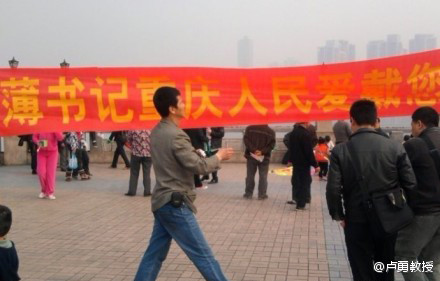China is now possibly, apparently, invisibly in the midst of political turmoil at the highest levels. In the wake of the public removal of Bo Xilai (薄熙来) last week as top leader in the municipality of Chongqing, there have been mounting rumors and hints, vague sketches of intrigue. Gunshots heard, say some, at the very heart of power. A mysterious black Ferrari, driven by an unknown man of possible consequence, crashing and burning on the capital’s outskirts (then the story swept under the rug of “harmony”). Finally, suggestions even of a thwarted coup attempt by China’s number nine, security chief Zhou Yongkang (周永康).
Of course, as several foreign correspondents have rightly remarked today, it’s impossible to say anything with certainty about what’s happening — and difficult, in fact, to say much of anything at all.
In other ways, though, the lingering uncertainty speaks for itself.
It’s simple enough, sure, to suggest that the more extreme plot lines are pure fabrication. But even if they are, the abiding sense of uncertainly and insecurity about what is happening at the top nonetheless exposes the volatility of Chinese politics.
Politics at the top in China, and in fact at every level, is still beyond scrutiny, three decades after Deng Xiaoping urged the need for political reform to avoid the kind of destabilizing fractures that could erupt into events like the Cultural Revolution.
The very fact that the rumors and curiosities this week have been “harmonized” rather than contradicted with facts will naturally lead many people to believe them, or believe at the very least that they are half-truths pointing to the same fundamental conclusion: that all is not well in Zhongnanhai.
The rumors might be easy enough to clear away. Who exactly was the man in the black Ferrari? And where is Zhou Yongkang, who appears to have been absent from the news for the past 48 hours?
Instead, there is a total information vacuum surrounding these apparent curiosities. They are left behind like spooky chalk outlines.
Continued traces of apparent political friction can be seen on Chinese social media, thanks to our colleagues here at the Journalism & Media Studies Centre, who have created an archive of select deleted (“permission denied”) posts.
Here, for example, is a deleted March 20 post from Lu Yong (卢勇), a public relations specialist for a company in Chengdu with more than 100,000 Weibo followers. Lu writes: “This is Chongqing right now, where people are still putting up banners like this one, and continuing to sing red songs.” The accompanying picture shows Chinese holding up a red banner with yellow characters that read, “The people of Chongqing love you, Secretary Bo [Xilai]!”

Other deleted posts, like this one from March 20 (removed yesterday), deal with the question of the mysterious black Ferrari that crashed on March 18.
Finally, this deleted post from prominent Chinese scholar Wu Jiaxiang (吴稼祥) may provide the most suitably crepuscular image for what we’ve seen in China over the past few days:
Hegel once said that wisdom was like an owl, and that it took flight only at dusk. But his was a nation of philosophy. Here in our country, we have no owls, only bats. Those bats are rumors, and they take flight after midnight from the microblogs that are their caves. These past few days the bats have been plentiful. Like talk of a “new Gang of Four” . . . The people playing these political tricks, they seem just like children trying to hoist 200-kilogram barbells over their heads. I worry for them.
[Frontpage Image: “Millions of Bats, Khao Yai“, posted by stijnbokhove to Flickr.com under Creative Commons license.]




















